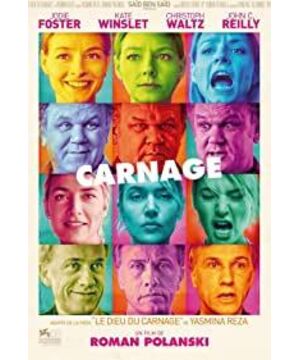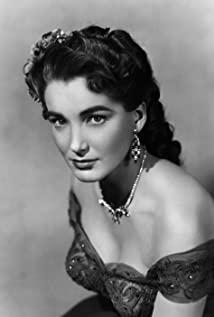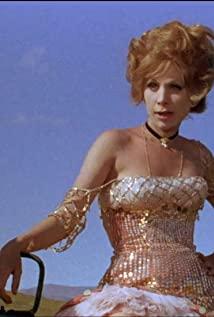Roman Polanski has always been a director I like very much, because he has a typical author style unique to him, whether it is the parallel wrestling of three people in his debut work "Knife in the Water", or the "Bitter Moon" "The self-thinking about the relationship between the sexes and the aberrations of human nature in "is full of Polanski's style of "not having a word, having the best of elegance".
As for the movie "Killing", if it is not known in advance, it is difficult to guess that it was made by Roman Polanski. This "atypical" Polanski-style film does not seem to have analyzed and reflected on the scourge of human nature. But if you take a closer look, you will find that the core of the whole movie is actually similar to "Knife in the Water"—the undercurrent surging and wrestling of two forces, the disguise in a civilized society, and the change of voice and collective consciousness. But the difference is that after 40 years of immersion in the film world, Polanski is already familiar with the narrative rhythm of the entire film, the subtle emotions, the mastery of the lens language, and the tuning of the actors.
Let me talk about the actors first. In this kind of completely enclosed space and relying only on dialogue to drive the plot turn, the actor's ability to coordinate his lines and his body is extremely tested. Jodie Foster and Kate Winslet, two Oscar queens, contributed textbook-like performances. They both acted as method actors to dig deeper into the characters through the actor's external body and expression. And the whole movie's performance is also heavily weighted on the two heroines. Polanski also knows that the emotional tension of women going crazy is greater than that of men. At the same time, the kind of intellectual women disguised in a civilized society to the hysterical vixen shown by the two behind are also for the movie. Stretched out a broader dimension.
The performances of the two male protagonists, John C. Reilly and Christoph Waltz, do not need to be so aggressive and exaggerated. Their role is to add to the flames. They need to use the realism of physical performance to dispel the unwarranted sense of anger of the two heroines. For example, in the two families sitting in the living room and graciously eating fruit pie and chatting. At this time, Christoph Waltz's cell phone rang, he stood up and held the fruit pie and spit out swearing words. Finally, he leaned against the wall and placed the fruit pie on the desk while he was eating. In this case, if Christoph Waltz's performance is missing any of the above links, it will not be enough to dispel the abrupt feeling of Jodie Foster's anger. But it is this kind of careless and rude body details time and time again. It laid the groundwork for the emotional outburst between Jodie Foster and Kate Winslet.
In terms of mirroring and scene scheduling, Polanski is definitely considered a master. He is extremely good at using a certain medium to create a certain atmosphere or using the special attributes of a certain object to reflect the effect he wants. In "Killing", this medium is the mirror on the porch. It appears in the picture more than once, as shown in the figure below. It not only allows us to observe the subconscious reactions of other characters under a single point of view lens, but also freezes some frames. The lens refracts a richer depth mirror image. This is also an important reason why only dialogue in such a sealed space does not annoy the audience at all.
For example, the depth shot of the opening scene can be divided into six layers. The first layer is Christoph Waltz closest to the lens, the second layer is Kate Winslet and John C. Reilly, the third layer is Jodie Foster, and the fourth layer is the computer and On the wall, the fifth floor is the window, and the sixth floor is the train speeding outside the window.
The depth of the famous film history in the film directed by Orson Welles, "The Great Amberson", has reached seven levels of horror. Such rich levels and collocations can even be fixed for a few minutes without moving. Here, you can also make your eyes roam freely in the picture.
Before discussing the content of "Killing", let us first talk about Polanski's "Knife in the Water". This fledgling but shocking debut debut has the same effect as "Killing".
It is about a middle-aged middle-class couple who was driving to the beach for a "yacht holiday" when they met a young student who was hitchhiking. The husband agreed to take the young people on the boat for the weekend out of a weird and secret showy mentality. In order to resist the wealth and class superiority of middle-aged couples, young people call themselves "hikers". On the one hand, they use the western and spiritual redemption title of "hiking" to show their spiritual level. On the other hand, the sense of superiority in women also acts on women's natural fascination with such rough, unrestrained, primitive and poetic men.
The basis of the play of "Knife in the Water" is the tension transmitted between the balance and imbalance of power in this triangular relationship.
The same is true of "Killing". Two couples came forward to negotiate and negotiate the matter because of their children's fight. On the one hand, they are a wealthy bourgeois couple with a singularity, and an ordinary middle-class family on the other. The constant change of power reflects the Polanski-esque core-the consequences of envy and greed in human nature. The unfolding of the contradiction between the two families is also reflected in this kind of inconsistency dialogue.
But what is interesting is that the two couples, Kate and Christoph, and Jodie and John, are not always on the same front in the movie. Instead, they are in a hostile relationship at many moments. In the whole movie, the fact that countless incidents and trivial incidents caused the change of camp is the spirit of the whole movie.
The cause of the incident was that Zachary, the son of the Kate family, injured the son of the Jodie family.
The first change of camp occurred when Christoph was constantly answering the phone when negotiating with the two families, and Jodie’s words seemed unreasonable, which caused Christoph’s dissatisfaction, and Kate and John had to stand between their husbands and johns. Wife here. The contradiction surrounding the first camp change lies in the discord between the children and the educational concepts of the two parties. The christoph family is in a fully stocked posture. Facing the struggle between boys, they advocate solving problems by themselves like men, while the jodie family has strict requirements for the children. Jodie’s sentence: "We will take him to the concert whenever we have time. Or a gallery." It also reflects.
The second camp change was when the two sides negotiated. Both husbands thought it was a good thing for the child to have their own small team, but both wives did not agree with this view. Here, the two camps have also undergone a subtle shift in psychology. The contradiction surrounding this change of camp lies in the difference in educational concepts within the husband and wife.
The third camp change was a wrestling between the husbands of Jodie and Christoph. The two laughed at each other's work. Christoph didn't like John's lowly job selling hardware, and John didn't like Christoph's daily hypocrisy. Hypocritical appearance. This heavy contradiction lies in the identity difference between the ordinary middle class and the upper bourgeoisie.
In the fourth camp change, Jodie and Kate separately accused her husband. Jodie thought her husband was rude and savage, and didn't understand him at all. If Jodie's complaint represents the troubles of working-class families. The accusation of Kate is a spiritual accusation that is separated from the material. So Kate later threw her husband's mobile phone into the water, making the two wives stand in the same camp. What surrounds is the contradiction between the three views and the way of getting along between husband and wife.
The mobile phone that rang at the end implied the beginning of a new round of contradictions. Regardless of whether Christoph picks it up or not, the contradictions of life will continue. The contradictions of work, the contradictions of husband and wife, the contradictions of self-cognition, and the trivial contradictions in life are all Performed repeatedly.
In the end, the reconciliation between Zaryk and Ethan is as good as ever, and it is ironic. The cruelty of the adult world and the simplicity of the children's world can be seen in full view.
View more about Carnage reviews










